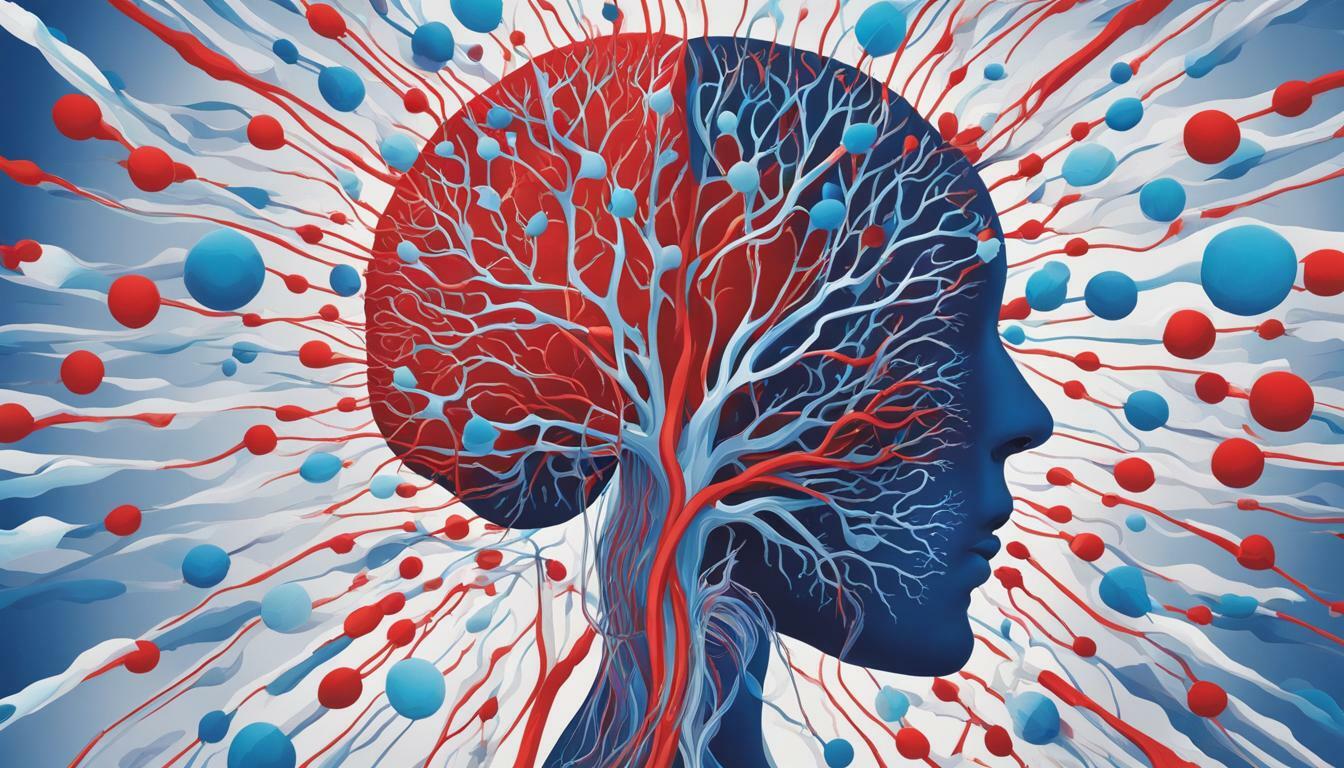UTIs are known to have a significant impact on mental health, often causing altered mental status in affected individuals. Understanding the connection between UTIs and changes in mental abilities is crucial for proper diagnosis and treatment. In this section, we will explore the reasons behind why UTIs can lead to altered mental status and delve into the scientific mechanisms at play.
Key Takeaways:
- UTIs can cause changes in mental abilities, leading to altered mental status.
- The immune system and brain changes play a significant role in UTI-associated altered mental status.
- A study conducted by Cedars-Sinai researchers highlights the potential use of IL-6 inhibitors in treating UTI-associated delirium in elderly patients.
- Identifying UTI symptoms in the elderly population can be challenging, particularly in individuals with a communication barrier.
- Early detection and treatment of UTIs are essential in preventing or managing altered mental status.
Understanding the Immune Response and Brain Changes
The immune response triggered by UTIs, particularly the action of interleukin 6 (IL-6), plays a crucial role in causing brain changes that lead to altered mental status. Research conducted by Cedars-Sinai researchers sheds light on the connection between UTIs and changes in mental abilities.
In a study using laboratory mice, the researchers observed that mice with UTIs exhibited higher levels of anxiety and lapses in short-term memory, which are common symptoms of delirium. Additionally, structural changes were observed in the brains of mice with UTIs. These findings suggest that UTIs can induce brain changes that contribute to altered mental status.
IL-6, a protein involved in the immune response, has been identified as a key player in the development of UTI-associated delirium. When IL-6 is excessively produced in response to a UTI, it can lead to brain injury and changes within the neurons, resulting in delirium-like behavior. In a study conducted by Cedars-Sinai researchers, treatment with antibodies that blocked the effects of IL-6 resolved the delirium-like behavior in mice with UTIs, suggesting a potential treatment approach for UTI-associated delirium in humans.
Further studies on the connection between UTIs and altered mental status
While this study provides valuable insights into the immune response and brain changes associated with UTIs and altered mental status, further research is needed to fully understand the underlying mechanisms. Future studies could explore delirium in other conditions associated with increased incidence of UTIs, such as Alzheimer’s disease, Parkinson’s disease, stroke, and multiple sclerosis. By studying these connections, researchers can potentially identify new treatment approaches and improve outcomes for patients with UTI-induced delirium.
| Study Summary | Findings |
|---|---|
| Cedars-Sinai Study | Blocking IL-6 resolved delirium-like behavior in mice with UTIs, suggesting a potential treatment approach for UTI-associated delirium in humans. |
| Systematic Review | Identified a valid relationship between delirium and UTI in elderly patients, emphasizing the importance of considering UTI as a potential cause of delirium in this population. |
| Algorithm Implementation | An algorithm was created to assist in the diagnosis and treatment of UTIs in noncommunicative patients, providing guidance for clinicians in identifying UTI symptoms that do not rely on patient report. |
Overall, understanding the immune response and brain changes that occur during UTIs can provide valuable insights into the development of altered mental status. By identifying the role of IL-6 and exploring potential treatment approaches, researchers aim to improve outcomes for patients with UTI-associated delirium.
Cedars-Sinai Study on UTI-Associated Delirium
Researchers at Cedars-Sinai have made significant progress in understanding UTI-associated delirium, with promising findings suggesting that blocking the action of IL-6, a protein in the immune system, could help resolve delirium symptoms in older patients.
In a study published in the Journal of Neuroinflammation, the researchers observed laboratory mice with UTIs and found that they exhibited higher levels of anxiety and lapses in short-term memory, common symptoms of delirium. The mice also showed structural changes in their brains. This led the researchers to investigate the role of IL-6 in UTI-associated delirium.
By treating some of the infected mice with antibodies that blocked the effects of IL-6, the researchers were able to resolve the delirium-like behavior. “Treatment with anti-IL-6 antibody in the UTI group normalized all the brain changes, both structural and functional,” said Dr. Shouri Lahiri, the director of the Neurosciences Critical Care Unit and Neurocritical Care Research at Cedars-Sinai.
| Key Findings: |
|---|
| 1. Blocking the action of IL-6 could resolve delirium symptoms in older patients with UTIs. |
| 2. Mice with UTIs exhibited higher levels of anxiety and lapses in short-term memory, similar to delirium symptoms. |
| 3. Structural changes were observed in the brains of mice with UTIs. |
This study provides valuable insights into the biological mechanisms behind UTI-associated delirium and suggests that targeting IL-6 could be a potential treatment approach for delirium in older patients with UTIs. Further clinical trials with anti-IL-6 antibodies are needed to determine their effectiveness in humans.
Identifying UTI Symptoms in the Elderly
UTI symptoms in the elderly population can often present atypically, making it challenging to diagnose and treat UTIs, which can ultimately lead to altered mental status. In this age group, urinary tract infections may not manifest with the typical genitourinary symptoms, such as painful urination or urinary urgency, making it difficult for patients to report their symptoms clearly. Instead, elderly individuals may experience non-specific symptoms such as confusion, dizziness, drowsiness, falls, urinary incontinence, or poor appetite, which can be indicators of a UTI.
A systematic review conducted to understand the relationship between UTIs and delirium in the elderly population revealed that UTIs are a common cause of mental status changes, especially in elderly patients and those with psychiatric conditions. The review emphasized the need for healthcare providers to be aware of and evaluate these atypical symptoms when assessing elderly patients with delirium or confusion, as prompt diagnosis and treatment are crucial to prevent further complications and ensure appropriate care.
Urinary tract infections are responsible for a significant number of geriatric hospitalizations and visits to emergency departments each year. Therefore, it is important for healthcare professionals to consider UTIs as a potential underlying cause when assessing elderly patients with altered mental status, even in the absence of typical genitourinary symptoms. This will help to minimize delays in diagnosis and provide appropriate treatment to prevent further deterioration of cognitive function.
Algorithm for Diagnosing UTIs in Noncommunicative Patients
To aid in the diagnosis and treatment of UTIs in elderly patients who have a communication barrier, an algorithm has been developed to assist healthcare providers in identifying UTI symptoms that do not require patient report. The algorithm focuses on objective indicators, such as vital signs, physical exam findings, and laboratory results, to guide the diagnosis and treatment decision-making process.
This algorithm aims to provide a comprehensive resource to assist healthcare providers in the difficult clinical situation of diagnosing UTIs in noncommunicative patients. By relying on objective criteria and considering the atypical presentation of UTI symptoms in the elderly, healthcare professionals can make accurate diagnoses and provide appropriate treatment. The implementation of this algorithm in the psychiatric emergency department has shown positive results in terms of improving symptom documentation and decreasing unnecessary antibiotic use.
| Tips for using the UTI algorithm |
|---|
| Patients with severe systemic symptoms require further infective work-up and should be evaluated outside of this algorithm |
| Immunocompromised patients should be evaluated outside of this algorithm |
| Pain should be considered positive if grimacing, retracting, or other non-verbal markers of pain are present on physical exam |
| Pyelonephritis should be considered in patients with systemic symptoms and/or costovertebral angle pain/tenderness |
| Cystitis treatment options: |
| – Begin empiric treatment and adjust based on culture results |
| – Duration of therapy: 5 days for uncomplicated, 7 to 14 days for complicated |
| Pyelonephritis treatment options: |
| – Begin empiric treatment and adjust based on culture results |
| – Duration of therapy: 14 days |
The Importance of Early Detection and Treatment
Early detection and prompt treatment of UTIs are crucial in preventing or managing altered mental status and its associated complications, highlighting the importance of addressing UTIs in a timely manner. UTIs can lead to changes in mental abilities, causing symptoms such as confusion, disorientation, and impaired memory. For elderly patients, these mental changes can be particularly significant and may even result in prolonged hospital stays, long-term cognitive problems, and increased mortality.
Research conducted by Cedars-Sinai has shed light on the connection between UTIs and delirium in older patients. The study found that the immune system’s response to UTIs can cause brain changes, leading to delirium and its associated mental changes. This discovery opens up the possibility of using IL-6 inhibitors as a treatment for UTI-associated delirium in humans. Blocking the action of interleukin 6 (IL-6), a protein involved in the immune response, could potentially resolve the delirium that often accompanies UTIs in elderly patients.
In the elderly population, UTI symptoms may present atypically, making diagnosis challenging, especially in individuals with a communication barrier. It is essential to be aware of the signs of UTIs in the elderly, such as urinary incontinence, frequent falls, poor appetite, and altered mental state. Timely identification and treatment of UTIs can help prevent or manage altered mental status and its associated complications. Healthcare providers should be vigilant in assessing elderly patients for UTI symptoms, even in the absence of typical genitourinary symptoms, to ensure early detection and appropriate intervention.
By recognizing the importance of early detection and treatment, healthcare providers can mitigate the impact of UTIs on mental health and overall well-being. Implementing strategies for early identification, such as utilizing diagnostic algorithms and educating healthcare professionals about the specific challenges of diagnosing UTIs in noncommunicative patients, can improve outcomes and reduce the burden of UTI-related altered mental status in the elderly population.
FAQ
Q: Why do urinary tract infections (UTIs) cause altered mental status?
A: UTIs can lead to changes in mental abilities, including altered mental status, due to the immune system’s response to the infection. The immune response can trigger brain changes and inflammation that affect cognitive function.
Q: What are the specific biological mechanisms behind UTI-associated altered mental status?
A: The immune system’s response to a UTI, particularly the action of a protein called interleukin 6 (IL-6), can induce structural and functional changes in the brain. These changes can result in delirium and other alterations in mental abilities.
Q: What did the Cedars-Sinai study reveal about UTI-associated delirium in elderly patients?
A: Cedars-Sinai researchers conducted a study that found blocking the effects of IL-6 in laboratory mice with UTIs resolved the delirium-like behavior. This suggests that IL-6 inhibitors could be a potential treatment for UTI-associated delirium in humans, particularly in elderly patients.
Q: How are UTI symptoms in the elderly different from those in younger individuals?
A: UTI symptoms in the elderly can be atypical and may manifest as delirium, confusion, dizziness, falls, urinary incontinence, or poor appetite in the absence of fever. This can make the diagnosis of UTIs challenging, especially in individuals with a communication barrier.
Q: Why is early detection and treatment of UTIs important in preventing or managing altered mental status?
A: Early detection and treatment of UTIs can help prevent or manage altered mental status in individuals with UTIs. By addressing the infection promptly, the immune response and resulting brain changes can be minimized, leading to a better prognosis and improved cognitive function.





